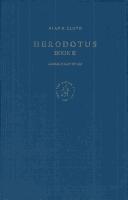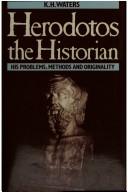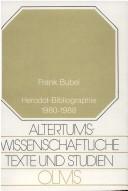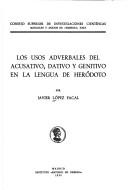| Listing 1 - 10 of 35 | << page >> |
Sort by
|
Book
ISBN: 9783883096759 Year: 2011 Publisher: Nordhausen, Thür : Bautz,
Abstract | Keywords | Export | Availability | Bookmark
 Loading...
Loading...Choose an application
- Reference Manager
- EndNote
- RefWorks (Direct export to RefWorks)
Herodotus. --- Herodot --- Hérodote --- Herodotos --- Rome --- Historiography. --- Herodotus van Halicarnassus --- Herodotus --- Gerodot --- Hērodotos --- Erodoto --- Hérodote --- Heródoto --- הירודוטוס --- הרודוט --- הרודוטוס --- هردوت --- هيرودوت --- Ἡρόδοτος

ISBN: 9004041796 9004041826 9004077375 9004041818 0585332304 058532641X 9004295097 9004301356 9789004077379 9789004041790 9789004041820 9004295100 Year: 1975 Volume: 43 Publisher: Leiden
Abstract | Keywords | Export | Availability | Bookmark
 Loading...
Loading...Choose an application
- Reference Manager
- EndNote
- RefWorks (Direct export to RefWorks)
The collection of thirteen codices found in upper Egypt near Nag Hammadi in 1946 is one of the major archaeological discoveries of our time. Apparently the library of a Gnostic community in late antiquity, the codices are a repository of important spiritual materials from throughout the ancient world. Hence a thorough analysis of this new material is indispensable for any proper understanding of the history of religions in this period. The rich documentation which the codices add to early Coptic text material promises to raise to a new precision the historical analysis of that language.|This edition presents collotype reproductions in natural size of all folios of the thirteen codices as well as reproductions of the covers and photographs previously taken of fragments that are now lost.
Herodotus of Halicarnassus --- Herodotus --- Herodotus. --- Criticism and interpretation --- 938 --- History Ancient world Greece --- Herodotos, --- Erodoto --- Gerodot --- Herodot --- Hérodote --- Heródoto --- Hērodotos --- Herodotus van Halicarnassus --- Herodotos --- הירודוטוס --- הרודוט --- הרודוטוס --- هردوت --- هيرودوت --- Ἡρόδοτος --- Criticism and interpretation. --- Egypt --- History --- Description and travel. --- Description and travel --- Criticism. --- Historiography. --- Rome --- Religious life and customs.
Book
ISBN: 9783110239119 9783110239669 3110239663 1283429993 9781283429993 3110239116 9786613429995 Year: 2011 Volume: 3 Publisher: Berlin Boston De Gruyter
Abstract | Keywords | Export | Availability | Bookmark
 Loading...
Loading...Choose an application
- Reference Manager
- EndNote
- RefWorks (Direct export to RefWorks)
Herodots Historie ist das erste erhaltene Geschichtswerk Europas. Immer wieder aber wurde der Autor auch kritisiert; so prägt Cicero zwar den Terminus "Vater der Geschichtschreibung", bemängelt aber zugleich die Fiktionalität in dessen Werk. In der Tat ist gerade das mythische Geschichtenerzählen ein Hauptcharakteristikum bei Herodot und die Durchmischung fiktionaler Tradition und rationalistischer Innovation hat auch moderne Leser bisweilen irritiert.Diese "Mythisierung" historischer Geschehnisse resultiert jedoch nicht aus naiver Anekdotenfreude. Vielmehr wird eine Interpretation der historischen Ereignisse erst durch den assoziativen Gehalt möglich, den die mythische Folie innerhalb der griechischen Erzähltradition mit sich bringt. Es wäre zu einfach, Herodots Verwendung mythischer Folien als bewusste auktoriale Intention zu deuten. Somit ist auch die hier geleistete Rekonstruktion eines mythisch-rituellen Bezugsfelds ein notwendiger Bestandteil zum Verständnis Herodots, der weniger als "Vater der Geschichtsschreibung" denn als Erbe einer Geschichtentradition erscheint.
Hérodote --- Herodotus. --- Herodotus --- Style --- Literary style. --- Herodot --- Herodotos --- Herodotus van Halicarnassus --- Gerodot --- Hērodotos --- Erodoto --- Hérodote --- Heródoto --- הירודוטוס --- הרודוט --- הרודוטוס --- هردوت --- هيرودوت --- Ἡρόδοτος --- Geschichtsschreibung. --- Herodot. --- Historiography. --- HISTORY / Ancient / General. --- Style.

ISBN: 070993601X 9780709936015 Year: 1985 Publisher: London : Croom Helm,
Abstract | Keywords | Export | Availability | Bookmark
 Loading...
Loading...Choose an application
- Reference Manager
- EndNote
- RefWorks (Direct export to RefWorks)
Herodotus --- History, Ancient --- Historiography --- -Ancient history --- Ancient world history --- World history --- Herodot --- Gerodot --- Hērodotos --- Erodoto --- Hérodote --- Heródoto --- הירודוטוס --- הרודוט --- הרודוטוס --- هردوت --- هيرودوت --- Ἡρόδοτος --- Historiography. --- Herodotus. --- -Historiography --- Hérodote --- Herodotos --- History, Ancient - Historiography --- Herodotus - History

ISBN: 3487095076 9783487095073 Year: 1991 Volume: 20 Publisher: Hildesheim : Olms-Weidmann,
Abstract | Keywords | Export | Availability | Bookmark
 Loading...
Loading...Choose an application
- Reference Manager
- EndNote
- RefWorks (Direct export to RefWorks)
History, Ancient --- Bibliography --- Herodotus --- -Ancient history --- Ancient world history --- World history --- -Herodot --- Gerodot --- Hērodotos --- Erodoto --- Hérodote --- Heródoto --- הירודוטוס --- הרודוט --- הרודוטוס --- هردوت --- هيرودوت --- Ἡρόδοτος --- -Bibliography --- Hérodote --- Herodotos --- Ancient history --- Herodotus. --- Bibliography. --- History, Ancient - Bibliography --- Herodotus - Bibliography

ISBN: 8400039890 Year: 1974 Publisher: Madrid : Consejo Superior de Investigaciones Científicas [C.S.I.C.][España],
Abstract | Keywords | Export | Availability | Bookmark
 Loading...
Loading...Choose an application
- Reference Manager
- EndNote
- RefWorks (Direct export to RefWorks)
Greek language --- -Classical languages --- Indo-European languages --- Classical philology --- Greek philology --- Case --- Herodotus --- -Herodot --- Gerodot --- Hērodotos --- Erodoto --- Hérodote --- Heródoto --- הירודוטוס --- הרודוט --- הרודוטוס --- هردوت --- هيرودوت --- Ἡρόδοτος --- Language --- -Case --- -Language --- Hérodote --- Herodotos --- Herodot --- Language. --- Herodotus van Halicarnassus
Book

ISBN: 9783110581539 3110581531 3110582104 3110583550 9783110583557 9783110582109 Year: 2018 Publisher: Berlin Boston
Abstract | Keywords | Export | Availability | Bookmark
 Loading...
Loading...Choose an application
- Reference Manager
- EndNote
- RefWorks (Direct export to RefWorks)
Recently the importance for Herodotus' work of contemporary medical and sophistic thought and techniques of argument has been widely recognised, as long had been his dependence on and difference from earlier geographical and ethnographic writing. This volume focuses on the place of these interests in his investigatory techniques and sets them alongside his many narrative skills, from superficially traditional battle narrative and reworking of Greek or non-Greek traditions that border on myth to the structuring of narrative by highlighting the life of objects, and addresses such fundamental issues as how he chooses between competing explanations and how far he valued truth. The book tackles many of the basic issues that confront any attempt to understand Herodotus' work.
History, Ancient --- Historiography. --- Herodotus --- Criticism and interpretation. --- Herodotus van Halicarnassus --- Herodot --- Hérodote --- Herodotos --- Gerodot --- Hērodotos --- Erodoto --- Hérodote --- Heródoto --- הירודוטוס --- הרודוט --- הרודוטוס --- هردوت --- هيرودوت --- Ἡρόδοτος --- Herodotus. --- narrative technique. --- scientific enquiry.
Book
ISBN: 9781477318324 9781477318331 147731833X Year: 2021 Publisher: Austin
Abstract | Keywords | Export | Availability | Bookmark
 Loading...
Loading...Choose an application
- Reference Manager
- EndNote
- RefWorks (Direct export to RefWorks)
In the 5th century BCE, Herodotus wrote the first known Western history to build on the tradition of Homeric storytelling, basing his text on empirical observations and arranging them systematically. Herodotus and the Question Why offers a comprehensive examination of the methods behind the Histories and the challenge of documenting human experiences, from the Persian Wars to cultural traditions.In lively, accessible prose, Christopher Pelling explores such elements as reconstructing the mentalities of storyteller and audience alike; distinctions between the human and the divine; and the evolving concepts of freedom, democracy, and individualism. Pelling traces the similarities between Herodotus's approach to physical phenomena (Why does the Nile flood?) and to landmark events (Why did Xerxes invade Greece? And why did the Greeks win?), delivering a fascinating look at the explanatory process itself. The cultural forces that shaped Herodotus's thinking left a lasting legacy for us, making Herodotus and the Question Why especially relevant as we try to record and narrate the stories of our time and to fully understand them.
History, Ancient --- Historiography. --- Herodotus --- Criticism and interpretation. --- Greece --- Historiography --- Herodotus van Halicarnassus --- Herodot --- Hérodote --- Herodotos --- E-books --- Gerodot --- Hērodotos --- Erodoto --- Hérodote --- Heródoto --- הירודוטוס --- הרודוט --- הרודוטוס --- هردوت --- هيرودوت --- Ἡρόδοτος --- Herodotus, history, greek historiography, ancient historiography.
Book
ISBN: 8884431182 Year: 2005 Volume: 88 Publisher: Trento : Università degli studi di Trento, Dipartimento di scienze filologiche e storiche,
Abstract | Keywords | Export | Availability | Bookmark
 Loading...
Loading...Choose an application
- Reference Manager
- EndNote
- RefWorks (Direct export to RefWorks)
Historiography --- History, Ancient --- Historiographie --- Histoire ancienne --- Herodotus --- Herodotus. --- Herodot --- Hérodote --- Herodotos --- Herodotus van Halicarnassus --- Gerodot --- Hērodotos --- Erodoto --- Hérodote --- Heródoto --- הירודוטוס --- הרודוט --- הרודוטוס --- هردوت --- هيرودوت --- Ἡρόδοτος --- Hérodote (0484?-0420? av. J.-C.) --- Grèce --- Antiquité --- Jusqu'à 395
Book
ISBN: 9789004269132 9789004273887 9004273883 9004269134 1306808480 Year: 2014 Volume: 368 Publisher: Leiden ; Boston : Brill,
Abstract | Keywords | Export | Availability | Bookmark
 Loading...
Loading...Choose an application
- Reference Manager
- EndNote
- RefWorks (Direct export to RefWorks)
Twentieth century commentaries on Herodotus' passages on Nubia, the historical kingdom of Kush and the Aithiopia of the Greek tradition, rely mostly on an outdated and biased interpretation of the textual and archaeological evidence. Disputing both the Nubia image of twentieth century Egyptology and the Herodotus interpretation of traditional Quellenkritik , the author traces back the Aithiopian information that was available to Herodotus to a discourse on Kushite kingship created under the Nubian pharaohs of the Twenty-Fifth Dynasty and preserved in the Ptah sanctuary at Memphis. Insufficient for a self-contained Aithiopian logos, the information acquired by Herodotus complements and supports accounts of the land, origins, customs and history of other peoples and bears a relation to the intention of the actual narrative contexts into which the author of The Histories inserted it.
Herodotus --- Knowledge --- Nubia --- Nubie --- History --- Sources. --- Histoire --- Sources --- Herodotus van Halicarnassus --- Herodot --- Gerodot --- Hērodotos --- Herodotos --- Erodoto --- Hérodote --- Heródoto --- הירודוטוס --- הרודוט --- הרודוטוס --- هردوت --- هيرودوت --- Ἡρόδοτος --- Nubia. --- Nūbah --- نوبة --- بلاد النوبة --- Herodotus - Knowledge - Nubia --- Nubia - History - Sources
| Listing 1 - 10 of 35 | << page >> |
Sort by
|

 Search
Search Feedback
Feedback About UniCat
About UniCat  Help
Help News
News